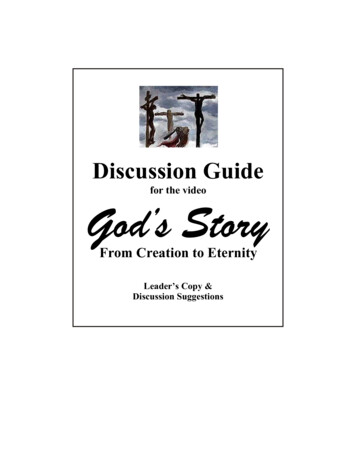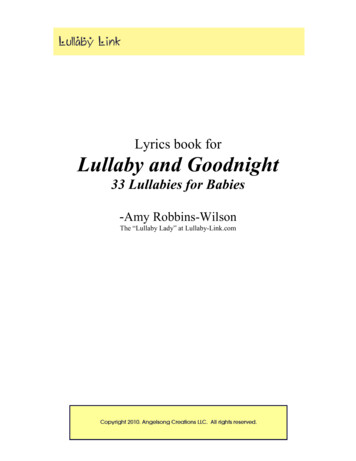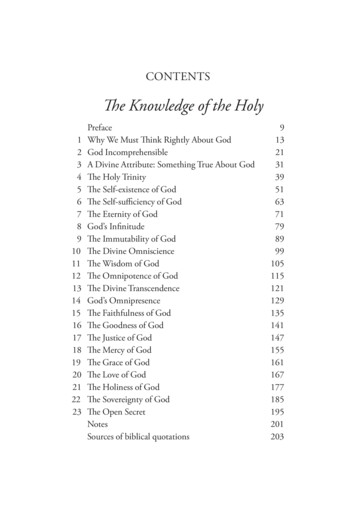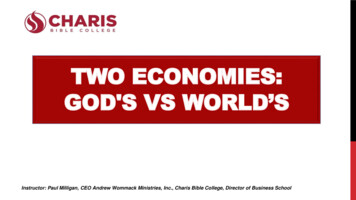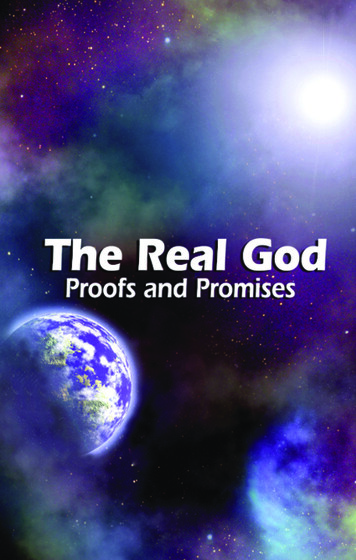
Transcription
The Real God:Proofs and Promisesby Douglas S. WinnailWhy is the God of the universenot real to most people today?Why is there so much skepticismand doubt about God?If you have ever ponderedthese questions, the answerscould change your life!
ContentsPAGE1911131619222427Questions About God?Proof 1 – Creation Demands a CreatorProof 2 – Life Demands a Life-GiverProof 3 – Laws Demand a Law-GiverProof 4 – Design Demands a DesignerProof 5 – Fulfilled Prophetic PromisesProof 6 – Answered PrayerProof 7 – A Way of Life That WorksConclusion: A Coming JudgmentRG Edition 1.4, January 2008 2008 LIVING CHURCH OF GODTMAll rights reserved. Printed in the U.S.A.This booklet is not to be sold!It has been provided as a free public educationalservice by the Living Church of GodScriptures in this booklet are quoted from the New King James Version ( ThomasNelson, Inc., Publishers) unless otherwise noted.
Questions About God?Have you ever wondered whether God actually exists? Canyou know for sure? Can you prove it? Is there one trueGod, or are there many gods? Is the idea of God merely theproduct of the human imagination? Does it make any difference ifyou believe in God or not? These are among the most importantquestions you could ever ask. However, in our modern secular world,we know more about television schedules, celebrities’ private lives,and professional athletes’ statistics, than we know about God!While millions profess to believe in God, the true God is justnot that real to most people. How real is God to you? Is the Godyou worship the same God revealed in the pages of the Bible—oris your concept of God something conjured up in men’s mind?Has the doubt and skepticism permeating our society influencedyour ideas about God? Today many people have real difficultieswhen it comes to finding solid answers about God.It may come as a shock to you, but our modern, sophisticated,well-educated world has been deceived when it comes to life’s biggestquestions! The truth about the real God has been perverted and suppressed—not just by atheistic philosophers and secular scientists, butby misguided theologians! This may sound like an outrageous statement, but it is exactly what the Bible revealed would happen, and itis verified by historical facts, as we will see in this booklet.Atheists claim that God does not exist, and that the idea ofGod is an invention of the human mind. Agnostics say it is impossible to know whether or not God exists. Evolutionary biologists1
The Real Godprefer to think that God is not necessary. Secular scientists want toeliminate God from all discussion on the assumption that thewhole idea of God rests on personal belief and not on proof.Unwittingly, misguided and misinformed theologians play intothis deception by suggesting that you can take God’s existence onblind faith—just believe—no proof is necessary or possible!With so-called experts offering such conflicting ideas, it is nowonder that the average person has doubts and reservations aboutGod. Do you have doubts? We ask for a receipt as proof that we havepurchased an item. We get a deposit slip when we put money in thebank. Yet when it comes to the most important question in life, weare told we can just “take it on faith”—blindly, without any proof—that God exists! Or we listen to “experts” claiming that God does notexist, or that we cannot know for sure, but we do not seriously question or demand any verification for such dramatic statements.For much of the last century, many have taken for granted thatscience can explain the universe without God, and that His existence is doubtful at best. Sometimes it is claimed that intelligentpeople no longer believe in God—yet nothing could be furtherfrom the truth! Theologians who make excuses for the Bible andshrink from making dogmatic statements about God and HisWord, in an attempt to harmonize science and religion, have onlysucceeded in undercutting their own influence. Much of organized religion is in decline today simply because the truth aboutthe real God has been ignored, perverted and suppressed.The God of the Bible challenges us to prove that He really doesexist—and He offers specific ways to do that. The real God predictsthe future, and challenges anyone to do the same with any similardegree of accuracy. The God who inspired the Bible boldly states thatto live contrary to His instructions invites disaster. The real God isgoing to send Jesus Christ back to this earth to put a stop to humanmisrule and establish His kingdom—on this earth, not in heaven—asa world-ruling government with the aid of His saints. Is this the Godyou worship? Is this the God you hear about when you go to churchor tune in a religious broadcast on radio or television? Probably not!In this booklet, you will see how and why the knowledge of thereal God has been perverted and suppressed. You will learn why our2
Questions About God?modern society is so skeptical when it comes to questions aboutGod. You will see why mankind’s questions about God will just notgo away. You will also be able to study for yourself seven definitiveproofs that demonstrate that God is real and very much alive.But first, we need to understand why our modern culture is soskeptical and mixed up when it comes to questions about God,and how it became that way. Let us notice why belief in God hasbeen discounted as being unimportant, and examine the consequences of that misguided approach. You cannot afford to remainin the dark about such fundamental issues. The real answers mayshock and surprise you!Superficial ReligionCurrent surveys indicate that approximately 95 percent ofAmericans believe in God—yet many Americans live their lives asif God does not exist. More than 80 percent seldom or neverattend church or read a Bible. Only about 30 percent view theWord of God—the Bible—as the ultimate authority in their lives.Most just follow their conscience and do whatever they think isbest—or whatever they please! In European countries, belief inGod is much lower, and the number of people who do not regularly practice any faith is even greater. In Britain, France, Italy,Germany and Scandinavia, only 30 percent or less believe in a personal God (The Empty Church: The Suicide of Liberal Christianity,Reeves, 1996, pp. 51, 61–65). These figures indicate that for mostpeople today—even in so-called “Christian” countries—belief inGod is just not a relevant part of their lives.While interest in religion among Americans runs high, Americahas been described as a secular and materialistic society. VanderbiltDivinity School professor Edward Farley asserts “religiosity is marginal” to most of our cultural institutions—government, business,education and entertainment. Pollster George Gallup found thatAmerica is a “nation of biblical illiterates” where fewer than half ofall adults can name the four gospels of the New Testament (ibid.,pp. 49, 63). Fewer than half of Americans can name even five of theTen Commandments—the fundamental principles that the real God3
The Real Godoutlined for human society. When one cannot even name the commandments, it is not surprising if one does not live by them!Today, many practice a superficial “consumer Christianity” or“cafeteria religion”—that is, people pick and choose what religious tenets they wish to believe and reject those teachings that donot appeal to their interests. For many people, religious beliefs areoften personal, vague, generalized and casual. Levels of confidence and conviction are often rather low. Doctrinal specifics areusually fuzzy. Each person tends to believe what seems to be rightin his or her own eyes. This is part of the legacy of the ProtestantReformation—where the individual, not the church or the Bible—becomes the sole authority (ibid., pp. 61–62). As one teenagerresponded when asked by a reporter about what she thoughtabout God: “God is everywhere. God is in me. I am God.” Theseare, as we shall see, sadly misinformed opinions!America and the European countries are described today ashaving entered a “post-Christian era” (ibid., chapter 2). We nolonger believe the actual teachings of Jesus Christ, as found in theWord of God. The Bible states that Jesus Christ will return to reignon this earth with His saints (Daniel 2:44–45; 7:27; Revelation5:10, 11:15–18), yet mainstream Christianity teaches, and mostprofessing Christians prefer to believe, that we all go to heaven.God said to remember the Sabbath (Exodus 20:8–11); yet mostpeople “do their own thing” on this day. The Bible condemns fornication, adultery and murder; yet these behaviors permeate oursocieties. Noted educator, author and American civil servantWilliam Bennett has written, “We have become the kind of societythat civilized countries used to send missionaries to” (ibid., p. 66).This is largely because we have forgotten, rejected, or perhaps neverheard about the real God. But just how did this happen?Reason Replaces ReligionThe America that on its coins proclaims to the world, “In GodWe Trust,” developed from European roots. Europe had receivedthe knowledge of the true God from the Apostles, who brought itfrom Jerusalem to the European peoples. We learn in school that4
Questions About God?western civilization was built on the noble ideas of Greek democracy and Roman law, yet both the Bible and history reveal how themisguided religious ideas of these ancient pagan cultures have contributed to the current confusion. In the book of Acts, we read thatthe Apostle Paul told superstitious pagan Athenians about the onetrue God. Noticing an inscription “TO THE UNKNOWN GOD,”Paul stated: “The One whom you worship without knowing, Him Iproclaim unto you” (Acts 17:23–24). They may have practiceddemocracy, but they were sadly misinformed about religious truth!In Rome, Paul was even more explicit. He told the Romansthat “the wrath of God is revealed from heaven against all ungodliness and unrighteousness of men, who suppress the truth inunrighteousness, because what may be known of God is manifest[evident] among them, for God has shown it to them” (Romans1:18–19). He told these educated Romans that they were withoutexcuse for not knowing about the true God, “for since the creation of the world His invisible attributes are clearly seen, beingunderstood by the things that are made” (Romans 1:20). Paul further states that misguided humans “although they knew God did not glorify Him as God.” As a result, their understanding wasdarkened so that, “professing to be wise, they became fools whoexchanged the truth of God for the lie, and worshiped and served thecreature [creation] rather than the Creator” (Romans 1:21–25).The Bible reveals a remarkable human tendency and its consequences: “Even as they did not like to retain God in their knowledge, God gave them over to a debased mind,” which has led towidespread spiritual confusion, physical immorality and socialevils that still confront us today (Romans 1:26–32).Many today do not realize that the knowledge of the true Godand true Christianity, which Paul brought to Greece and Rome, wassoon corrupted with a mixture of pagan religious ideas. As RomanCatholic historian Will Durant writes: “Christianity did not destroypaganism; it adopted it.” The form of Christianity that developed inEurope and later spread to America and the rest of the world “wasthe last great creation of the ancient pagan world” (Caesar andChrist, Durant, 1944, p. 595). Durant and other historians explainthat belief in the one true God became belief in a Trinity as a result5
The Real Godof the influence of pagan philosophy. They note that pervertedGnostic ideas “obscured the Christian creed” and that theologiansschooled in pagan philosophy tried to explain the nature of Godthrough speculation instead of teaching what God had revealedabout Himself in Scripture. After centuries of such discussion anddebate, it is not surprising that the often abstract God of modernChristianity bears little resemblance to the true God of scripture.Other European ideas also undermined and altered theteachings about the real God. The Enlightenment of the 18thcentury, and scientific discoveries that seemed to contradictScripture, led some to conclude the Bible and its God were onlymyths (see God’s Funeral, Wilson, 1999). Darwin’s speculationsabout evolution seemed to remove the need for a God of creation. Julian Huxley, a promoter of Darwin’s ideas, confidentlystated: “There is no longer either need or room for supernaturalbeings capable of affecting the course of events in the evolutionary pattern of thought. The earth was not created, it evolved. Sodid all the animals and plants that inhabit it, including ourhuman selves, mind and soul as well as brain and body.” Huxleyalso asserted boldly that, “operationally, God is beginning toresemble not a ruler, but the last fading grin of a cosmicCheshire cat.” In the face of what seemed to be overpoweringdiscoveries made by scientists, theologians retreated and backpedaled in their teachings about God.Huxley made another observation that is still influencing contemporary views of God. He commented: “Our concept of Godneeds to stress religious experience instead of a belief in a particulardogma.” In other words, God is the warm feeling that you feel inyour heart—not a Supreme Being whose existence you can proveand who intervenes in history. This idea was promoted in the1600s by the French philosopher Pascal who said: “It is the heartthat experiences God, and not the reason.” The Reformation theologian, John Wesley, also spoke of the “warmed heart” as a signthat one had discovered religious truth. Yet all this clashes dramatically with Paul’s admonition to a Greek audience to “prove allthings; hold fast to what is good” (1 Thessalonians 5:21). Theprophet Malachi quotes God as saying: “Prove Me” (Malachi 3:10,6
Questions About God?KJV). Proof involves solid and convincing reasons. Belief in thereal God involves the mind—not just warm feelings in the heart!Over the last two centuries, belief in God has come underattack by many intellectuals in the West—the children of theEnlightenment. The German philosopher Nietzsche asserted that“God is a thought.” Freud termed belief in God a form of mentaldisorder that mankind would eventually grow out of. Karl Marxtermed religious belief “the opium of the people.” Atheist H. L.Mencken asserted: “God is the immemorial refuge of the incompetent, the helpless, the miserable.” Playwright Tennessee Williamsdescribed God as a “senile delinquent.” In the 1960s, prominenttheologians echoed Nietzsche’s earlier sentiments and actuallyasked: “Is God dead?” Oxford zoologist Richard Dawkins asserted,in a speech titled A Scientist’s Case Against God, that there is noevidence to support religion, and that better educated peopletoday admit this (Science, August 15, 1997, p. 892). He claims thatanyone who believes in a Creator God is “scientifically illiterate.”In light of such assaults against belief in God, the near absenceof powerful biblical teaching by clerics, and the dearth of honest,objective presentations of physical evidence by scientists, it is notsurprising that the real God of this universe remains little known tomost people today. But questions need to be asked. Are the criticsright, or have they been deceived? Have the rantings of secular,atheistic individuals tragically misled our society about God? Let usnotice several important lessons that we can learn from the Bibleand our recent past that relate to questions about God. We will thenexamine seven proofs that demonstrate the reality of the true God.New Evidence, New LessonsDavid wrote in the Psalms more than 3,000 years ago: “Thefool has said in his heart, ‘There is no God’” (Psalm 14:1).Solomon states: “The mouth of fools pours out foolishness”(Proverbs 15:2). Looking back over the last few centuries it ispainfully obvious that many of the “enlightened” intellectualswho have molded our modern world were simply wrong! Theymade foolish assumptions and foolish statements that many peo7
The Real Godple believed! These misguided individuals were essentially theblind leading the blind.Marx’s communism proved to be a dismal failure that causeduntold suffering. Freud’s psychological theories have largely beendiscredited. While Freud proclaimed religion a neurosis, one ofhis students, Carl Jung, found religion to be very beneficial intreating psychologically disturbed individuals (God: The Evidence,Glynn, 1997, p. 69). In fact, a growing body of scientific literaturedocuments the positive effects of certain religious beliefs on personal health. Marx and Freud, whose ideas did much to secularizeour society by undermining its religious and moral foundation,were sadly mistaken about many things.The same is now being said about the ideas of Charles Darwinand his free-thinking contemporaries. The evolutionary theories ofDarwin that supposedly did away with the need for a Creator Godhave come under increasing criticism in recent decades. A growingnumber of scholars—among them cosmologists, biologists, biochemists and paleontologists—are admitting that the theory ofevolution simply does not and cannot explain the origin of theearth, the origin of life or the origin of species. The ideas generatedby Darwin and others simply do not fit with the facts of the fossilrecord or what has been discovered about the universe in the lastcentury (see Creation and Evolution, Hayward, 1995; “DebatingDarwin,” Christian Century, July 15–22, 1998, pp. 678–681).As the 20th century comes to a close and we begin a new millennium, questions about God are being asked with a new earnestness.Evolutionists’ purposeless universe has proven to be a psychologically empty and depressing concept. Surprising discoveries about theuniverse point to an intelligent creator (see Newsweek, July 20, 1998,pp. 47–52; November 9, 1998, p. 88). Naturalistic science thatseemed to provide answers to all questions is now recognized ashaving serious limitations. In the remainder of this booklet, we willsee what can be learned about the real God by examining proofsfrom both the natural world and the Bible. The evidence is astounding and it is powerful—and it comes from “scientifically literate”scholars. You can prove that God exists—you do not have to doubtor just blindly “take it on faith.” The God of the universe is real!8
Proof 1 —Creation Demands a CreatorThe theory of evolution postulates that the earth and theuniverse came into existence slowly over eons of time, orthat the universe has always existed. The atheistastronomer Carl Sagan once stated that, “the Cosmos is all that isor ever was or ever will be.” However that simply is not true!Studies in cosmology have demonstrated in recent years that therewas a time when the cosmos did not exist—that it had a beginningat a specific point in time. This is exactly what the Bible states. InGenesis 1:1 we read: “In the beginning God created the heavensand the earth.” Both the Bible and the discoveries of science clearly indicate that the earth and the universe have not always existed.Astronomers studying galactic motion have observed that theuniverse is expanding outward from a given point, but at a decreasing rate of speed. The universe appears to have begun with a largeexplosion. This is referred to as the “big bang.” Scientists havebeen able to detect echoes of this explosion that still reverberatethrough the universe—called the “radiation echo” or “backgroundnoise.” Stephen Hawking, a theoretical physicist at CambridgeUniversity, has written that the big bang cosmology may reveal “themind of God,” and American astrophysicist George Smoot has suggested that background radiation represents “the handwriting ofGod” (Science, August 15, 1997, p. 890). Such evidence is forcingscientists to reevaluate long-cherished naturalistic theories.Physicists have also formulated laws concerning thermodynamics.The First Law of Thermodynamics states that the amount of energy in9
The Real Godthe universe remains constant. The Second Law of Thermodynamicsstates that the amount of usable energy in a closed system (the universe) is decreasing. This means the universe is running down—thus,“it could not have existed forever in the past and will not exist foreverinto the future” (When Skeptics Ask, Geisler and Brooks, 1996, p. 220).It had a beginning. The existence of radioactive elements (such as carbon-14) which decay at a measurable rate (called a half-life) also pointsto a time when those elements were made radioactive. Again thispoints to a beginning. This, too, is contrary to what evolutionists havetheorized, but is consistent with Scripture.But what causative agent brought the universe into being?Science operates on the principle that for every effect there is acause. But what caused the “big bang?” Was it merely blind, naturalforces, or was it an intelligent being, a Creator God who carefullyplanned it beforehand? Since this was a one-time event that was notobserved or repeatable, the scientific method is of little value in rendering a decision on this matter. The subject of origins lies beyondthe realm of scientific investigation. However, the Bible describesthe origin of the universe and the earth in terms that are compatiblewith facts ascertained by scientists. The discovery that the universehad a definite beginning agrees with clear statements in the Bible.Scripture repeatedly refers to God as the Creator of the physical earth and universe (Genesis 1; Isaiah 40:28; Mark 13:19;Revelation 4:11). However, the real God is concerned with farmore than just the physical creation. The Bible also reveals there isalso an ongoing spiritual dimension to God’s creation.The Apostle Paul writes that when a person chooses to turnfrom a self-centered way of life, and chooses to begin living by theteachings of Jesus Christ, that person becomes a “new creation” ora “new creature” (2 Corinthians 5:17; Galatians 6:15). As we willsee, God has an incredible purpose for human beings who arewilling to embark on this challenging spiritual journey. The Bibleindicates very clearly there are more aspects to life than naturalistic science can discover. These aspects are revealed by theCreator—the real God of the universe—and are not discoverablein a laboratory by the scientific method! Creation, in all of itsaspects, requires a creator.10
Proof 2 —Life Demands a Life-GiverThe origin of life presents another challenge to those whowant to reject the idea of a supernatural God.Evolutionists have suggested that life formed spontaneously in a pool of chemicals as the earth cooled billions of yearsago. We are told that carbon, nitrogen, hydrogen and ammoniacombined randomly, with the aid of solar energy and cosmic rays,to form amino acids and DNA molecules. Over eons of time, cellssupposedly developed from these accidental combinations. Whilethis may sound plausible, biochemists know better. Scientists whohave tried to produce life by these methods have learned that it ismuch more difficult than their theories would suggest. A DNAmolecule contains as much information as a volume of an encyclopedia. Proposing this evolutionary theory of life’s origins isanalogous to suggesting that an explosion in a junk yard couldproduce a fully assembled automobile—and that this automobilecould then begin reproducing itself!In the 1950s, Stanley Miller performed a simple experiment tosee if these theories would actually work. He succeeded in producing some simple amino acids, and his experiment was hailed asproving that life could be generated spontaneously from non-livingmatter. However, the proclamations were premature. No one hasyet produced life from a pool of chemicals (pre-biotic soups)—inspite of a lot of tinkering. Astrophysicist Hugh Ross comments:“Even under highly favorable conditions of a laboratory, thesesoups have failed to produce anything remotely resembling life.11
The Real GodOne problem is that they produce only a random distribution ofleft- and right-handed pre-biotic molecules Life chemistrydemands that all the molecules be either right- or left-handed. Withall our learning and technology we cannot even come close tobringing life together in the lab” (The Creator and the Cosmos, Ross,1993, p. 148).Forty years after his initial experiment, Miller stated: “Theproblem of the origin of life has turned out to be much more difficult than I, and most other people, envisioned” (ScientificAmerican, February 1991, p. 117). German biochemist Klaus Dosehas observed that all the experimental efforts have “led to a betterperception of the problem of the origin of life on earth rather than toits solution. At present all discussions on principal theories andexperiments in the field either end in stalemate or in a confessionof ignorance” (The Creation Hypothesis, Moreland, 1994, p. 176).This is not surprising. Anaxamander of Miletus, the ancientGreek philosopher, also speculated that life could develop spontaneously from non-living matter. This superstitious idea prevaileduntil the 1800s when experiments done by Redi and Pasteur provedotherwise. These now-classic experiments revealed that maggotsappearing in spoiled meat came not from the meat but from theeggs of flies that came in contact with the meat. Life came fromlife—not from non-life. Until recent decades, this was referred to asthe law of biogenesis. Only in the last several decades—when scientists have attempted to generate life spontaneously to verify evolutionary theories—has this once-accepted law been ignored. Still,there is no evidence that exceptions to this law exist.Human beings can speculate that life could be generated spontaneously from non-living matter, but the facts do not agree withthese speculations. Man has not been able to produce life—inspite of considerable effort on the part of highly intelligent individuals. Scripture portrays God as creating life. In Genesis 2:7 weread: “The LORD God formed man of the dust of the ground andbreathed into his nostrils the breath of life; and man became a living being”—something all the sophisticated laboratories in theworld have been unable to begin to duplicate. Life demands a lifegiver. There appears to be no other way.12
Proof 3 —Laws Demand a Law-GiverScience exists because scientists understand that the universe operates in an orderly manner according to laws—the laws of physics (of gravity and of motion), the laws ofchemistry and laws of biology. As one writer comments: “Eversince Isaac Newton, science has blared a clear message; the worldfollows rules, rules that are fundamentally mathematical, rulesthat humans can figure out” (Newsweek, July 20, 1998, p. 49).Even evolutionists begin their speculations assuming that therules, or natural laws, worked the same in the beginning as theydo today. If the universe did not operate on these rules, or laws, itwould cease to function and would come apart in chaos. Noticeseveral examples of how these laws work.Gravity holds the planets in their orbits. Without gravitational forces there would be no solar systems. Stars and planetswould be hurtling through space in a helter-skelter manner.Gravitational forces hold the earth at a distance from the sunthat makes it possible for life to exist on this planet. If gravitational forces were either stronger or weaker than they are, stars(such as our sun) would not burn hot enough, or would burnout too rapidly and certain chemical elements essential for lifewould simply not be produced. Our bodies exist because chemicals combine in only certain ways. If chemical reactions did notoccur the same way every time (according to laws), we wouldcease to exist as living, breathing human beings. Life wouldcease to exist.113
The Real GodFor years, biology textbooks have referred to another lawknown as fixity of the species—that there seems to be a geneticlimit to the amount of variation that can occur within a species.Plant and animal breeders are aware of these limits. CharlesDarwin was aware of the variety that could be produced by breeding domestic animals (such as dogs, pigeons, cows and horses).During his cruise on the Beagle, he also observed striking variations among finches and turtles on islands in the Pacific Ocean. Informulating his theory of evolution, he speculated that, givenenough time, these small variations could eventually producetotally new species—that natural forces alone could produce newlife forms without the need for a creator. These ideas had a profound effect on the Western world—especially on its religion—and seriously undermined belief in God.However, time has exposed serious problems with Darwin’sideas. No one has ever observed a new species coming into existence in nature in this way. In spite of many attempts, neither hasanyone been able to produce new species by selective breeding.Dogs may vary in size, color and many other characteristics, butthey are still dogs. Horses are still horses. Fruit flies are still fruitflies. The Bible clearly states many times that God created eachtype of plant and animal “according to its kind” (Genesis 1:11–12,21–25). There is no evidence from the biological world that onespecies can turn into another. The Bible also indicates that Godcreated human beings after the “God kind”—which, as we willsee, has profound implications for the purpose of human life.Even the fossil record supports this fundamental biblical principle. Darwin speculated that intermediate forms of life must haveexisted as species evolved, yet he knew this was not the actualcase. He wrote in The Origin of Species: “Why then is not everygeological formation and every stratum full of such intermediatelinks? Geology assuredly does not reveal any such finely graduatedorganic chain, and this, perhaps, is the most obvious and gravestobjection that can be urged against my theory” (see Geisler andBrooks, p. 228). Darwin assumed these intermediate links wouldbe fo
Contents PAGE 1 Questions About God? 9 Proof 1 - Creation Demands a Creator 11 Proof 2 - Life Demands a Life-Giver 13 Proof 3 - Laws Demand a Law-Giver 16 Proof 4 - Design Demands a Designer 19 Proof 5 - Fulfilled Prophetic Promises 22 Proof 6 - Answered Prayer 24 Proof 7 - A Way of Life That Works 27 Conclusion: A Coming Judgment RG Edition 1.4, January 2008



